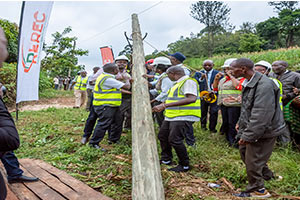

78% of Rural Kenyans Will Have Access to Electricity by REREC
Posted on : Wednesday, 24th July 2024

Kenya's urban areas, enlightened by electric lights, and rural settlements, shrouded in darkness, were drastically separated for decades. This lack of electricity restricted chances for education, stunted economic growth, and hampered development in large parts of the nation.
The Rural Electrification and Renewable Energy Corporation (REREC), on the other hand, has set out on a bold goal to close this disparity and provide light to Kenya's rural areas.
With the objective of providing clean, contemporary cooking solutions by 2028 and attaining universal access to power by 2026, REREC has set high standards for itself. A multifaceted strategy is required for this. Expanding the national grid to areas that were not previously served is one important strategy.
In addition, REREC is leading mini-grid initiatives that use hydro, wind, and solar energy to power isolated areas that are disconnected from the grid. There are challenges on the path to rural electrification. Logistical issues arise while developing infrastructure in widely separated geographical areas.
Utilizing innovative funding methods, public-private partnerships, and cooperation with county governments, REREC addresses this. Pay-as-you-go plans or crowdsourcing campaigns, for example, can be used to finance "last-mile" connection fees for a particular household.
REREC's initiatives are having a noticeable effect. After decades of darkness, villages are waking up to the emergence of thriving new cottage industries and companies.
Farmers can increase the shelf life of their produce by investing in cold storage facilities and using irrigation systems when they have steady power. Rural landscapes are being transformed by entrepreneurs who are opening grocery stores, phone charging kiosks, and welding businesses.
Electrification aims to enhance people's quality of life in general rather than just their economic standing. Children in villages with electricity can now study after dark, improving their access to education.





























































